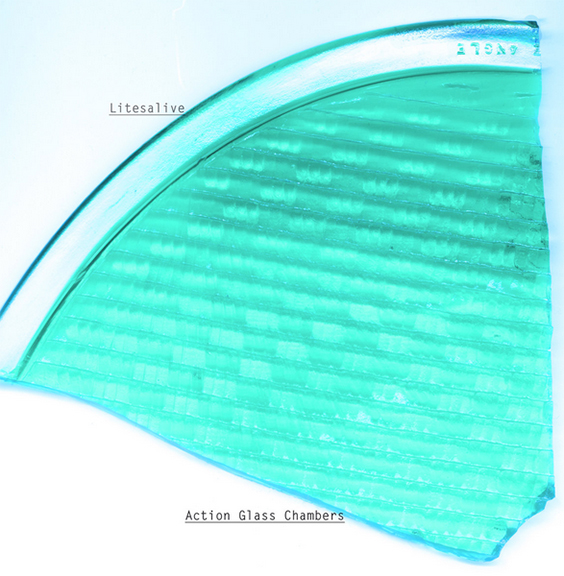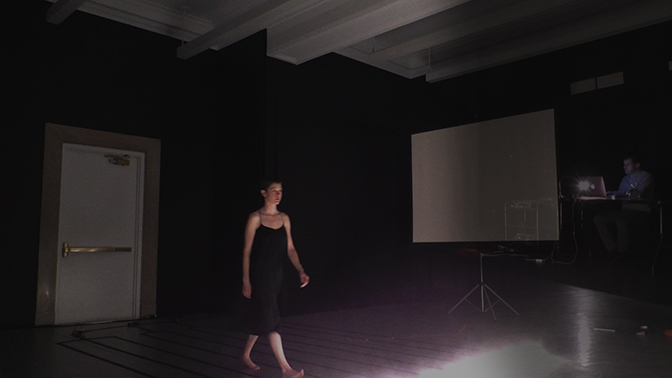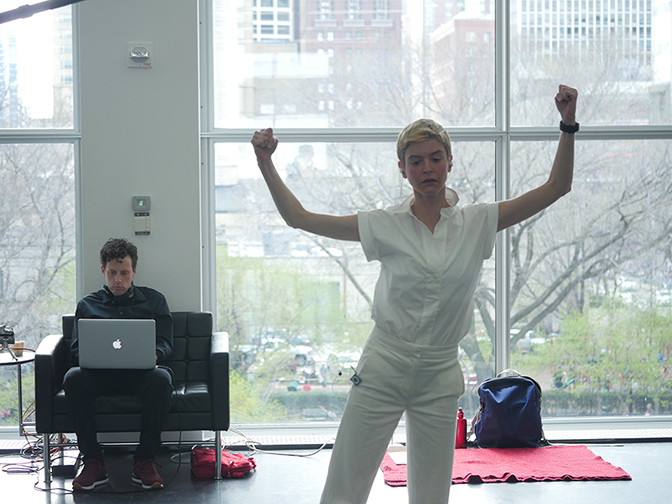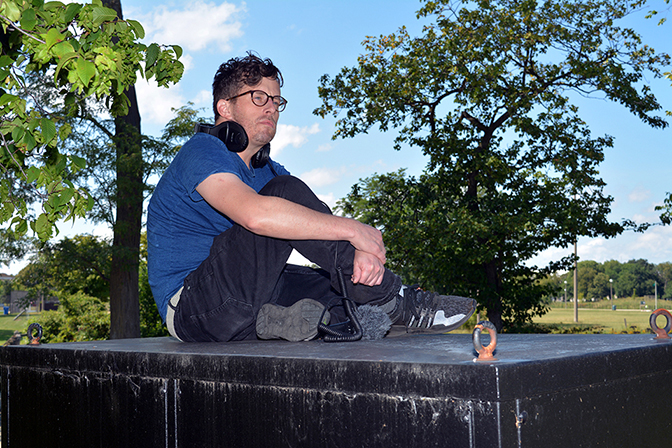Todd Mattei’s means for circumventing sonic and visual strategies during a period of life in transition reminds of the sweeping force we each encounter as creatives during fractured unpredictable moments. There is a clear sensitivity to his practice. This can be seen in the diverse array of art/music collaborations and projects or a combination of the two organized into a time-based experience. This week the COMP Magazine wandered through Humboldt Park with Mattei while discussing his youth out east, the role music played in bringing him to Chicago, how his inquiry examines and translates highly personal emotional and mental states of being and the current production of an experimental album/sound-work that will hopefully be released in the new year.

You grew up in Pittsburgh, but have lived in the city for some time, having played with a variety of bands and completing your MFA from UIC. Lets rewind a bit and discuss your early introduction to the arts and music. Can you share with us any specific early experiences that you see as being instrumental in directing you to pursue a career as an artist and musician?
There was actually a long time, as a child and teacher, that I was sure I was going to be a writer. Writing was one thing that I was good at, that felt natural to me in my early age. The funny thing is that I almost never read anything.
I got a bass guitar in 8th grade. My older brother played synthesizers and attempted a couple of bands, so it felt kind of normal to try it myself. I was an obsessive Cure fan, and I listened to almost nothing else between 7th and 9th grades. I had one lesson from my jazz-playing uncle, and I learned the rest of what I learned playing along to Simon Gallup’s bass parts. My next-door neighbor got a guitar at the same time, and we started a band before we could even tune our instruments. But our band ended up the center of our lives after a couple of years. Or maybe just mine. But we all loved doing it.
Anyways, music was much easier to get into in a regular way than writing. And though I didn’t give up on writing in high school, I did pretty much give up on it after one year of college, majoring in English literature and philosophy.

You originally came to the city to work as a musician. Can you identify what specifically drew you to Chicago? Perhaps, you can note your work with various bands (Joan of Arc) and interaction/collaboration/production with the experimental sonic scene here in the city.
The band Tortoise (along with Oval from Germany) changed the way I listened to all music during my first couple of years of college. Tortoise (and other Chicago bands) was the reason that I was originally drawn to Chicago, plus the fact that a few Pittsburgh friends moved there before me. The first time I saw the architecture on Michigan avenue, the wall of buildings, I was completely blown away (I didn’t have the critical sense to see that this was a tourist-trap area. Not that I don’t still love the skyscrapers here, regardless of who’s in them, and the fact that they basically symbolize the crushing weight of contemporary corporate capitalism).
Then, as it happened, my friend Jeremy who I’d known since 3rd grade, had gotten himself involved in a rather forward-thinking band called Joan of Arc (they were so forward looking that I didn’t get it at first at all).
Through a series of circumstances that I won’t try to recount, they happened to need a guitarist right as I was moving there, and so they asked me to join for long enough to get them through the summer tour. It ended up working out better than expected, though, and I stayed with the band for years.

When I consider your work and the manner you discussed it the idea of introspection and myth creation appears to be contrasted with revealing these insights via a tactile (video and sound) approach come to mind. I’m curious if these perceptions are accurate? Also, I’m wondering if you can discuss how your working process intersects with your ongoing investigations?
I think that in some way, all of the work I’ve made up until about 5 years ago is about being overwhelmed—by images, sounds, thoughts, information, sociality, moods, mental states, anxiety—and in trying to make a life in the world today. I think that my being overwhelmed comes from the often-monstrous character of the world, mixed with the particulars of who I am, both by nature and nurture (sorry for the cliché terms).
It’s such a loaded phrase, so I have often hesitated to use it, but I am a very sensitive person. Now, I think when people hear that a man believes himself to be sensitive, it means that he is like Stewart Smally from SNL, a kind of horribly neutered guy who feels somewhat eternally put-upon.
This is not what I’m talking about, I’m talking about having a thin, electric, and translucent skin. I’m talking about being “high reactive”, in the words of the writer Susan Cain. Things impact me pretty easily, lately I recoil from the sound of the Blue Line that I take every day from work.

Can you discuss your collaboration with Victoria Bradford on Declivity (2018) for the Museum of Contemporary Art. This site-response performance was the 1st in a series, Relay of Voices: The Great River Run, presented in various exterior spaces (e.g., the museum’s steps). In addition to Bradford, the piece’s movement element was executed by Angela Gronroos, Zack Bailey, Carla Gruby, Lisa Leszczewicz, and Ben Sanders. This long-form work will last for 120 days, engage 104 towns and cities, and cover 2,300 miles along the Mississippi River Valley from Minnesota to Louisiana.
Unfortunately, they did not end up doing the version proposed at the outset, and those dancers you mentioned are no longer participating (I wish they were still, or maybe in the future, but I don’t think it will happen). Victoria is, at this moment, somewhere in the south doing the last leg of the journey. But I won’t know the details for some time.
Leading up to this, however, was a very fruitful collaborative practice between Victoria and I. We performed together at several venues, including the Cultural Center and the MCA. Since seeing a Merce Cunningham performance maybe 18 years ago or more, I had always wanted to work with a dance artist. Our collaboration is what reinvigorated my music-making, and I hope we’ll work together again one day. I think she is an amazing dancer.

You are currently working on an album that is currently under production with a date TBA. Can you walk us through the process of creation? How does this differ or build upon previous works?
To be honest, the details of the full release keep changing a bit, and I don’t know when that particular release will finally be out. But the label is lined up, and I hope things move briskly, because I’ve had to be really patient due to circumstances of every sort. I am going to be included on a compilation with the label Standards and Practices, who are based in Chicago, NY, and Berlin, and the fact that they are distributed through Europe and already have an audience is great for me. I have unusual confidence that this music practice will find its place in due time, so I try not to freak out about delays in anticipated releases and other setbacks. I was always meant to do this stuff as slowly as necessary, but it took me most of my life up until now to learn it.
This differs from previous works in my level of focus. The last time I was working on my own music, I was in a personal state of chaotic ambivalence about just about everything, so the music lived in a haze of uncertainty. Some of it was still pretty good, but the music I make now is much more decisive—and disciplined.
I had open heart surgery two years ago, and there were some very impactful complications that occurred, putting me in a coma for maybe a day, and in an ICU for 5 or 6 more. I won’t get into all of the details of that very significant experience, but I will say that it seriously paired down what I would allow to crowd my mind and absorb my energy. And this music is being made after that event, so…

Museum of Contemporary Art, Chicago, 2017
What do you value most in your aesthetic practice?
In the end, I want to transmit to others a relationship of feeling, a living mirror of my place in the world, opening onto what’s between all people. I have felt, since a child, that words don’t reach others without leaving a lot out, too much. My slightly more adult self might say that language is inadequate for telling the truth, because the truth is massive and endless. Art, music, poetic language, cartoons–these are a way of sharing, a way that is more vital and inclusive.

In addition to the noted, do you have any addition projects underway? What’s the plan for the remainder of 2019 and new year?
I want to be performing regularly. I am opening a show at the Empty Bottle on October 17th.
There is another kind of performance/experience of my music which I am working on, and for which I have a couple of dates/venues lined up. I have been developing a kind of hypnosis-healing-meditation experience, wherein the audience receives music and sounds while blindfolded. It’s pretty new-age in spirit perhaps, but the music and sound is more interesting than what I think of when people say “new age music”.
I used to not know how to speak. But things not said still grow. Life is a lot.

For additional information on the art and music of Todd Mattei, please visit:
Todd Mattei – https://www.toddmatteiart.com
Carrie Secrist Gallery – http://www.secristgallery.com/exhibitions/2011/todd-mattei-healing/
The Visualist – http://www.thevisualist.org/2014/11/todd-mattei-territories/
Vimeo – https://vimeo.com/user1908627
Artist interview and portrait by Chester Alamo-Costello


